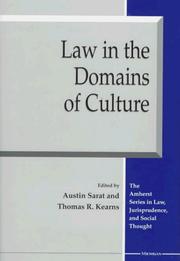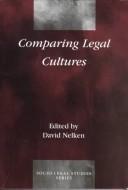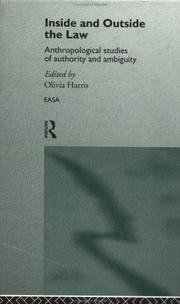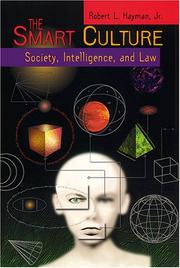| Listing 1 - 6 of 6 |
Sort by
|

ISBN: 047210862X Year: 1997 Publisher: Ann Arbor (Mich.) : University of Michigan press,
Abstract | Keywords | Export | Availability | Bookmark
 Loading...
Loading...Choose an application
- Reference Manager
- EndNote
- RefWorks (Direct export to RefWorks)

ISBN: 9781315259741 9781351949958 9781855218987 9781855217188 185521718X 1855218984 Year: 1997 Publisher: Aldershot Dartmouth
Abstract | Keywords | Export | Availability | Bookmark
 Loading...
Loading...Choose an application
- Reference Manager
- EndNote
- RefWorks (Direct export to RefWorks)
Culture and law. --- Culture and law --- Law and culture --- Law --- Legal theory and methods. Philosophy of law

ISBN: 0415129281 041512929X 9780415129282 9780415129299 Year: 1997 Publisher: New York ; London Routledge
Abstract | Keywords | Export | Availability | Bookmark
 Loading...
Loading...Choose an application
- Reference Manager
- EndNote
- RefWorks (Direct export to RefWorks)
Culture and law --- Law and anthropology --- Culture et droit --- Droit et anthropologie --- Culture (Droit) --- Culture -- Droit --- Cultuur en recht --- Droit culturel --- Droit de la culture --- Droit à la culture --- Recht en antropologie --- Law and anthropology. --- Culture and law.
Book
ISBN: 9041103864 9789041103864 Year: 1997 Publisher: Dordrecht Kluwer law international
Abstract | Keywords | Export | Availability | Bookmark
 Loading...
Loading...Choose an application
- Reference Manager
- EndNote
- RefWorks (Direct export to RefWorks)
Culture and law --- Law --- Culture et droit --- Droit --- Congresses --- Congrès --- International encyclopaedia of laws --- 34 --- -Law --- -#RBIB:gift.1997.1 --- #A9710A --- Acts, Legislative --- Enactments, Legislative --- Laws (Statutes) --- Legislative acts --- Legislative enactments --- Jurisprudence --- Legislation --- Law and culture --- Rechtswetenschappen. --- Congresses. --- 34 Rechtswetenschappen. --- Congrès --- #RBIB:gift.1997.1 --- Lawyers --- Rechtswetenschappen --- 34 Rechtswetenschappen --- 34 Law. Jurisprudence --- Law. Jurisprudence --- Law - Congresses --- Culture and law - Congresses
Book
ISBN: 2802707612 9782802707615 Year: 1997 Publisher: Bruxelles : Emile Bruylant,
Abstract | Keywords | Export | Availability | Bookmark
 Loading...
Loading...Choose an application
- Reference Manager
- EndNote
- RefWorks (Direct export to RefWorks)
Law of real property --- Biens culturels--Protection (Droit international) --- Cultural property [Protection of] (International law) --- Cultuurgoederen--Bescherming (Internationaal recht) --- Culture and law --- Culture et droit --- Intérêt culturel --- --Droit --- --Culture --- --Biens --- --Propriété --- --Patrimoine --- --#A9704A --- #A9704A --- --Biens culturels--Protection (Droit international) --- Industrial and intellectual property --- --Industrial and intellectual property --- Cultural property [Protection of ] --- Law and legislation --- --Culture and law --- Droit --- Culture --- Biens --- Propriété --- Patrimoine --- DROIT CIVIL FRANCAIS --- DROIT DES BIENS --- CLASSIFICATION --- NOTION DE CULTURE

ISBN: 9780814744789 0814744788 0814735339 0814735347 0585002592 Year: 1997 Publisher: New York, NY : New York University Press,
Abstract | Keywords | Export | Availability | Bookmark
 Loading...
Loading...Choose an application
- Reference Manager
- EndNote
- RefWorks (Direct export to RefWorks)
What exactly is intelligence? Is it social achievement? Professional success? Is it common sense? Or the number on an IQ test? Interweaving engaging narratives with dramatic case studies, Robert L. Hayman, Jr., has written a history of intelligence that will forever change the way we think about who is smart and who is not. To give weight to his assertion that intelligence is not simply an inherent characteristic but rather one which reflects the interests and predispositions of those doing the measuring, Hayman traces numerous campaigns to classify human intelligence. His tour takes us through the early craniometric movement, eugenics, the development of the IQ, Spearman's "general" intelligence, and more recent works claiming a genetic basis for intelligence differences. What Hayman uncovers is the maddening irony of intelligence: that "scientific" efforts to reduce intelligence to a single, ordinal quantity have persisted--and at times captured our cultural imagination--not because of their scientific legitimacy, but because of their longstanding political appeal. The belief in a natural intellectual order was pervasive in "scientific" and "political" thought both at the founding of the Republic and throughout its nineteenth-century Reconstruction. And while we are today formally committed to the notion of equality under the law, our culture retains its central belief in the natural inequality of its members. Consequently, Hayman argues, the promise of a genuine equality can be realized only when the mythology of "intelligence" is debunked--only, that is, when we recognize the decisive role of culture in defining intelligence and creating intelligence differences. Only culture can give meaning to the statement that one person-- or one group--is smarter than another. And only culture can provide our motivation for saying it. With a keen wit and a sharp eye, Hayman highlights the inescapable contradictions that arise in a society committed both to liberty and to equality and traces how the resulting tensions manifest themselves in the ways we conceive of identity, community, and merit.
Mental health laws --- Intelligence quotient --- IQ (Intelligence quotient) --- Equal protection of the law --- Intelligence levels. --- Culture and law. --- Equality before the law --- People with mental disabilities --- Civil rights --- Educational psychology --- Law and culture --- Law --- Intellectually disabled persons --- Mental disabilities, People with --- Mentally deficient persons --- Mentally disabled persons --- Mentally disordered persons --- Mentally handicapped --- Mentally retarded persons --- People with intellectual disabilities --- Retarded persons --- People with disabilities --- Intellectual disability --- Mentally ill
| Listing 1 - 6 of 6 |
Sort by
|

 Search
Search Feedback
Feedback About
About Help
Help News
News